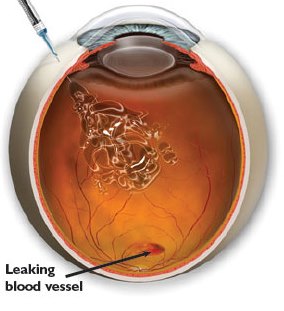How it Works:
When the anti-VEGF drugs are injected into the eye, they stop the growth of new blood vessels. These new blood vessels are bad because they grow abnormally and bleed into the eye. In some retinal diseases, the blood vessel growth is controlled by a growth factor called VEGF. Anti-VEGF medicines interrupt this process, which should slow the growth and any associated swelling. Steroids are only used in patients that don’t respond to anti-VEGF drugs.
What to Expect?
The exact steps of the treatment will depend on the hospital, but most include:
- Eye drops to dilate the pupil
- Anesthetic eye drops to numb the eye
- Cleaning the eye and surrounding skin to prevent infection (Your face may also be covered to keep the eye sterile)
- A device to hold the eye open during treatment
- An injection of anti-VEGF or steroid drugs
- Antibiotic drops
The injection will be delivered carefully using a very thin needle. Initially, you will need to get an injection every month. After the disease slows, the injections may be given less frequently or stopped entirely.
Side Effects & Complications:
Intravitreal injections are very safe. For some diseases, the drugs are so effective that doctors are using them instead of surgery. Side effects are rare, but they could include:
- Eye irritation
- Bleeding
- Floaters (fuzzy black shapes that move across your field of vision)
- Increased pressure in the eye
- Infection
There is a small risk of systemic vascular complications particularly if you have any heart or blood pressure problems.

